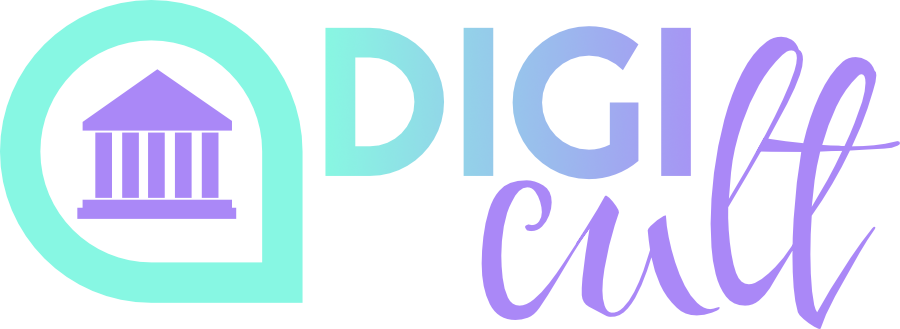Project Result 2
Digicult e-learning pathway and validation
| MONTHS | M8 | M9 | M10 | M11 | M12 | M13 | M14 | M15 | M16 | M17 | M18 | M19 | M20 | M21 |
Project Result 2 |
Start – end date: M8 01/08/2022 – M21 30/09/2023

Phase Leader: CIOFS.
Participating Organisations: TDS, FAI, UNIC, DIGIRPO, eMundus, NCK, IZTZG and BJC.
- Activity 2.1: creation of the content of the training modules and labs on the most innovative key areas, identified by partners, as relevant for developing new digital, methodological/relational competences as well as specific knowledge and skills. Task leader: BJC.
- Activity 2.2: development of digital educational resources for modules and labs in different formats (e.g: webinars, video-recordings, case studies, slides, e-books, articles, work projects and role-play) suitable for testing the DIGICULT pilot course. Task leader: UNIC.
- Activity 2.3: Piloting e-learning pathway and finalization of the modules + mobility activities. Task leader: CIOFS. (details in the table below).
- Activity 2.4: Validation: carried out by means of qualitative observation and feedback during the course, as well as specific evaluation. A report will be issued documenting the areas of improvement and the strengths of the course contents and the eLearning platform. Task leader: eMundus.
Results: 1 e-learning pathway + validation report.
Result Type: Course / curriculum – Pilot course / module.
Result Media: Interactive Resource, Website, Workspace, Video, Social Media, Text File.
Result Languages: English, Croatian, Italian, Lithuanian, Swedish, Greek.

The Course will involve 30 learners per Country and 40 learners in Italy and will last 160 hours, divided into 4 main parts: A, B, C and D.
Part A. e-learning Pilot Course, 4 Common modules (for both the 2 target groups) – 40 hours
Part B. e-learning Pilot Course 1 module for VET Learners – Young people – 20 hours
Part C. e-learning Pilot Course 1 module for VET Learners – Trainers – 20 hours
Part D. LTTA – Mobility split into two main sections:
C1 Blended mobility of VET Learners – Young peope (20 participants)
Location in IT at M15, lasting 5 days/40 hours
Coordinated by FAI (supported by CIOFS and TDS)
C2 Blended mobility of VET Learners – Trainers (7 participants)
Location: in SE at M16, lasting 5 days/40 hours
Coordinated by NCK
Overall, the entire pilot pathway will result in 80 hours of e-learning (A+B+C) and 80 hours of LTTA
Activity 2.1
The added value of the set of modules lies in the integrative nature of its approach and its orientation towards facilitating innovative training and learning approaches. Each module will represent an independent unit of study that can be combined with the other modules to form the pilot course or could be used separately to be integrated within other educational offers.
Based on the strategy paper, partners will model the modules. Once the scope, concept and title of each module are established and refined, the partnership will create the contents.
From M8 (August 2022) they will write their parts in English and exchange them with other organisation to translate them in the national languages.
Each module could be structured into hours of lesson, at distance/locally, focus groups, practical experiences. Modules will result in a training offer of 160 hours. The modules will be developed to offer blended and flexible learning opportunities, with face-to-face and at-distance lessons/practical joint group/project works.
This approach offers the opportunity of collaborating volunteers and students, and linking learning activities to practical activities.
Some examples of modules:
- Digital Cultural Heritage (impact of ICT on didactics)
- Useful resources for a “digital lesson” (e.g.: marketing; social network; webinar)
- Enhance accessibility and fruition (e.g.: digital story-telling, virtual libraries, gaming; virtual reality)
- Smart use of ICT (digital languages, smart use of the internet)
- Audience development and engagement
- Learning evaluation
- Life skills
Activity 2.2
During the development of the modules, a selection of the participants will be put in place; a final grid of criteria will be discussed and shared. This will reflect the target participants foreseen by DIGICULT (focus on people with cultural, social and economic obstacles) and the main scope of the project, being building synergies between cultural heritage and digital education in VET.
A particular attention will be paid to equal opportunities and to balance the composition of the group of participants in terms of gender.
The modules will be hosted on a web-based platform. In order to create a learning environment suitable to host all contents developed by partners, a simple interface is needed to allow all organisation to interact and exploit the tool at best. The platform will be chosen among the most agile and easy-to-use ones. For instance, “Moodle” is a reliable learning tool designed to deliver a good experience in a secure, customisable, open-source way or other similar platforms, will be selected.
During this activity, partners will develop all resources (labs, videos, webinars, slides…) which compose the Pilot Course. The course will be put online; it will be freely accessible so to guarantee the greatest social inclusion. The communication and promotion will take place through all channels of partners.

Activity 2.3
The result will be the e-learning Pathway (extra details in the table above).
Such an articulate course, together with the mobility, will be the occasion to evaluate and test both modules and resources.
The test will be carried out with questionnaires to participants, interviews to teachers, and “in class” observation, analysis between expected learning outcomes and those obtained by participants. On the basis of the results/participants feedbacks, as well as those of experts who will be asked to assess them, modules and resources will be improved, translated, published in the final version on the web site and Open educational platform as well as diffused to national and international level. The format and type of the educational resources will be designed to be suitable for blended learning, e.g.: to be used on line/at distance and in presence for group activities.
For participants who reach high level of performance about digital, cultural, life and/or key skills, an Open Badge is issued; a digital certificate to represent and share the skills acquired through an activity or training experience. The badge is issued by CIOFS through a digital platform, C-Box, which allows collecting, in a personal area, objectives and contents of the training activity, teaching materials, and learning outputs. The participants can decide whether to share their Badge with other people using the platform community and/or other social media that they habitually use (Linkedin, ePortfolio, etc…).
Activity 2.4
The validation will be carried out by means of qualitative observation and feedback during the course, as well as specific evaluation. A report will be issued documenting the areas of improvement and the strengths of the course contents and the eLearning platform.

Download
The Erasmus+ Project DIGICULT Course is available on the Moodle platform!
Here you can find the modules in the 6 project languages: English, Croatian, Italian, Greek, Lithuanian, and Swedish.
Info to access the modules:
- Click on the link HERE
- Select in the login box “Guest”
- Enter the password: digicult2023

